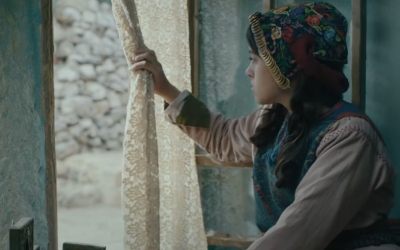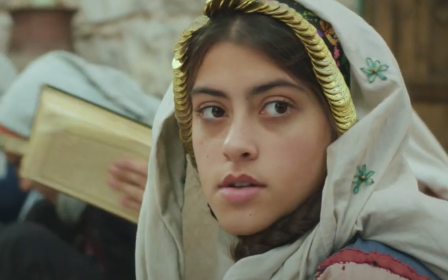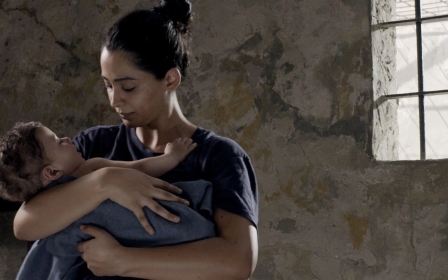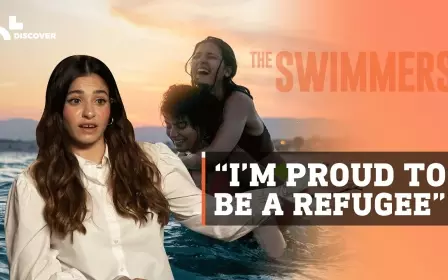Netflix's Farha: Nakba film resonates with Palestinians globally

Netflix viewers are lavishing praise on the feature film Farha, largely due to its accurate portrayal of the violence experienced by Palestinians during the creation of Israel in 1948.
The film, which is inspired by true events, revolves around a teenage girl named Farha who witnessed Zionist militias kill her family during the Nakba.
The Nakba literally translates as "The Catastrophe" and is commonly used to describe events surrounding the establishment of Israel, when more than 700,000 Palestinians were either expelled or fled their homes to make way for the new state.
It is a term that is also used to describe the violence meted out against the Palestinian Arab population during the period of British rule in Palestine, which extended from 1917 to 1948.
Since the film's release on 5 December, the hashtag #Farha has trended on Twitter in the UK, with thousands of people sharing positive reviews for the film, and encouraging others to watch it.
'My father watched Farha on Netflix. He said ‘every single thing that happened in this movie, I experienced in 1967'
- Social media user
Jalal Abu Khater, a Jerusalem-based writer, was among the many social media users who took to Twitter to share their thoughts on the film, and describe the experiences that their families faced during that fateful period.
"First scene in Farha showed a village that looks like Lifta, Jerusalem. It had me thinking of both my maternal grandparents, Fatima and Mahmood, who were expelled from Lifta in 1948, at a backdrop of gruesome massacres by Zionist gangs in neighbouring Deir Yassin, less than 2km away," he wrote.
The sentiment was shared by others, who called it "an essential watch", despite concerns that some scenes may be too emotional for younger viewers.
"My father watched Farha on Netflix. He said 'every single thing that happened in this movie, I experienced in 1967,'" one user wrote. Another replied: "My mother said something very similar."
Others praised the director for highlighting atrocities that they said were still taking place today.
"Finished watching Farha on Netflix and made me realise how lucky I am, being able to pause the movie whenever it got too triggering and emotional. Palestinians can’t press pause when they’re watching their friends and families get killed in front of them," another user wrote.
"Anyone who empathised with Anne Frank's story needs to watch Farha on Netflix," said another Twitter user.
'Loyal to the story'
Since the film's release, its director - Darin Sallam - and Netflix, have faced a barrage of abuse from Israeli officials and ordinary Israelis.
"It's crazy that Netflix decided to stream a movie whose whole purpose is to create a false pretence and incite against Israeli soldiers," said Israel's outgoing finance minister, Avigdor Lieberman.
There has also been a coordinated downvoting of its ratings online, with hundreds of spam accounts leaving negative reviews on the movie rating site Imdb.
Sallam and the film's producers condemned the "aggressive attacks" in a statement on 3 December, and efforts to silence Palestinians from telling their own story.
"The timing of this attack is not a coincidence as it was planned ahead of the film's screening in Saraya Yaffa theatre in the city of Jaffa," the statement read.
"The film's writer-director, Darin J Sallam, had an urge to tell this humane and personal story that she carried with her since her childhood and to share it with the world," the statement added.
Sallam was moved to make her debut film after being told the story by her father at a young age, and says it was based on real incidents.
The story, she says, stuck with her, partly due to her own struggle with claustrophobia and closed spaces.
She says accounts of a girl trapped in a small space, witnessing atrocities, resonated with her and she decided to include such depictions in her movie.
"I'm not afraid to tell the truth,” she said in a media interview in 2021, when the film premiered at the Red Sea International Film Festival.
"This is why I decided to make this film. Not because I'm political, but because I’m loyal to the story I heard," she added.
For Sallam, sharing the story with the world felt like a personal mission. "I want them [the audience] to live the journey of this young girl. I want them to see that it [Palestine] was a land with people and that they were living their lives, experiencing good and bad moments, until it was all interrupted," she added.
The events of the Nakba, while heavily documented, are not widely publicised in Israel.
A number of Israeli historians, including the University of Exeter academic Ilan Pappe, have written about Israeli atrocities in the lead-up to Israel's establishment.
Middle East Eye propose une couverture et une analyse indépendantes et incomparables du Moyen-Orient, de l’Afrique du Nord et d’autres régions du monde. Pour en savoir plus sur la reprise de ce contenu et les frais qui s’appliquent, veuillez remplir ce formulaire [en anglais]. Pour en savoir plus sur MEE, cliquez ici [en anglais].





